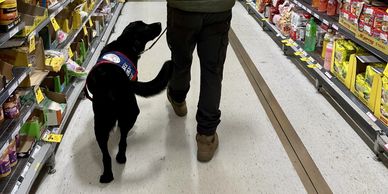Public access rights in australia
At Endex Service Dogs
Legal Recognition of Assistance Dogs in Australia
Legal Recognition of Assistance Dogs in Australia

We are committed to empowering individuals with disabilities to live with greater independence, dignity, and freedom.
From public access training to specialised task work for physical and/or psychosocial disabilities, we equip our dogs with the tools to provide necessary assistance, be safe and stable in the community, become a reliable, confident partner who fosters independence, restores dignity, and strengthens the human-animal bond. At Endex, we’re not just training Assistance Dogs — we’re transforming lives and building more inclusive, empowered communities — one partnership at a time.
Legal Recognition of Assistance Dogs in Australia
Legal Recognition of Assistance Dogs in Australia
Legal Recognition of Assistance Dogs in Australia

Under the Disability Discrimination Act 1992 (Cth) (DDA), people with a disability who rely on a trained Assistance Dog are legally entitled to access all public places, services, and modes of transport — without discrimination. The only exceptions to this may be spaces in which a person’s disability is being addressed by other means, or areas with stringent sterility requirements, for example:
• Specific Clinical Settings
• Surgically sterilised areas
• Industrial food preparation areas (kitchens)
• Quarantined areas
Refusing access to a person because they are accompanied by a trained Assistance Dog may constitute unlawful discrimination.
To Be Protected Under the DDA
Legal Recognition of Assistance Dogs in Australia
To Be Protected Under the DDA

An Assistance Dog must:
- Be accredited or trained to assist a person with a disability,
- Be trained to meet hygiene and behaviour standards appropriate for a public place, and
- Be under effective control of the handler at all times.
Identification
For Businesses and Service Providers
To Be Protected Under the DDA

All Endex Service Dogs in public carry visible identification, including:
- A vest or harness with the Endex Service Dogs logo,
- An Endex Service Dogs identification card displaying both the handler ID and dog's photo, certifying the dog’s status as a fully trained Assistance Dog with Endex Service Dogs.
For Businesses and Service Providers
For Businesses and Service Providers
For Businesses and Service Providers

We understand that accommodating an Assistance Dog in your venue may raise questions. Here’s what you need to know:
- You may not refuse entry or service to a person with an Assistance Dog, except in very limited circumstances (such as health regulations in operating theatres or certain food preparation areas).
- You may not charge extra fees for an Assistance Dog.
- You may respectfully ask to see proof of accreditation or training, but you cannot demand removal of the animal unless it is out of control or poses a direct threat to health or safety.
We encourage businesses to become familiar with their obligations and help create a more inclusive community.
Respect the Vest
For Businesses and Service Providers
For Businesses and Service Providers

Endex Service Dogs are working dogs. When you see one in public, please be aware:
- As tempting as it can be to show enthusiasm for an Assistance Dog, we kindly ask that you refrain from using excited voices or drawing attention to them. These dogs are highly trained to focus on their handler, and distractions can interrupt their work. It's also important to respect the handler’s privacy, as public attention can be overwhelming. The best way to support an Assistance Dog team is to admire quietly and let them go about their day undisturbed.
- Speak directly to the handler, not the dog,
- Respect their right to access — just like anyone else.
